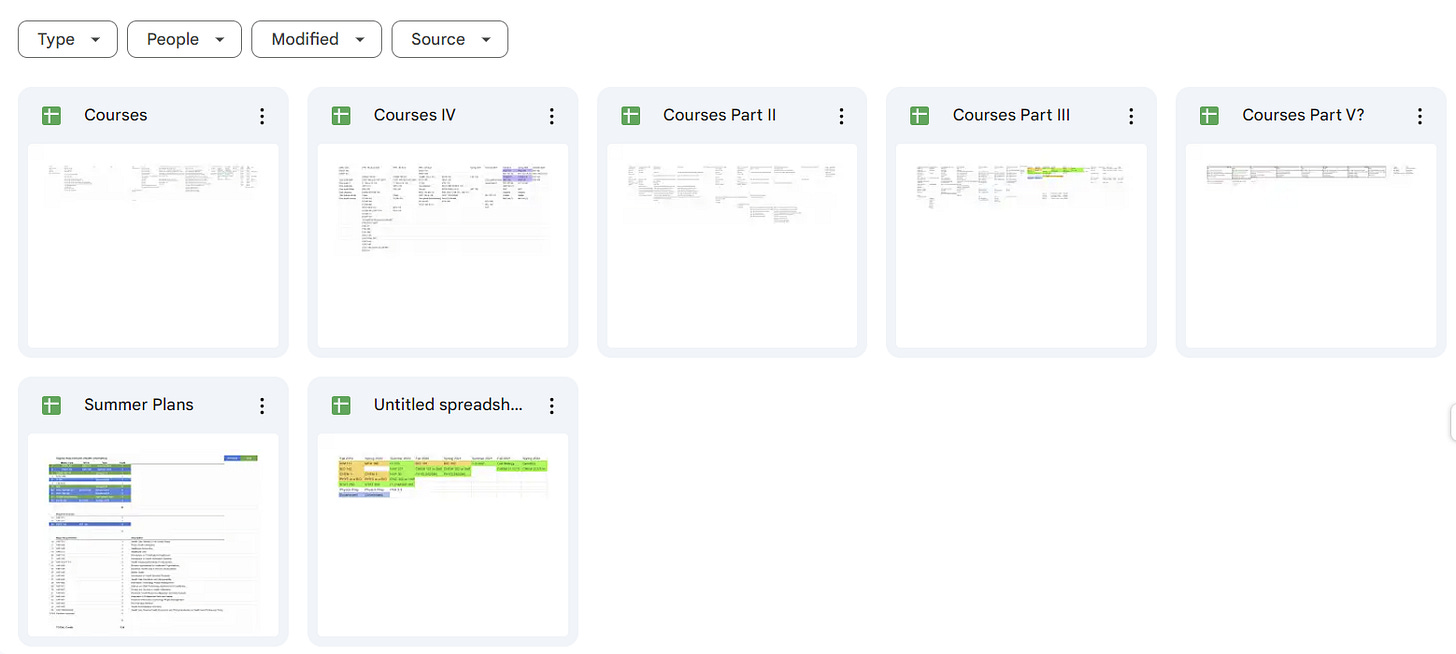Speedrun
Sometimes the best thing to do in school is to get out as soon as you can.
A letter from a CEP staff member.
Introduction
I think in a way, the role of the speedrunner is the exact opposite of the game designer. The game designer painstakingly carves a beautiful sculpture out of wood. [...] The speedrunner takes that sculpture and then looks it over, carefully from top to bottom, from every angle, [...] and then, having understood it perfectly, they break it over their knee.
Bennett Foddy, Developer, Getting Over It
Seldom do educators or parents advise children to spend less time in school. Due to cultural normalization, inertia, busyness or lack of practical alternatives, most American adults passively hold a basket of truisms about schooling: that it develops a child’s full potential, teaches “critical thinking” and “problem-solving,” and creates informed citizens and skilled future workers.
I am of the opposite inclination. My experience of the American schooling system was that it harmed my development more than it helped, and the best thing I did for myself was to compress the time I spent in it. This post is a guide for kids who want to do the same.
Looking back, I’ve only ever lived and learned outside the classroom; While I had intimate familiarity with the college admissions game as early as elementary school, by late freshman year of high school I’d lost all motivation to play it. I grew deeply tired of the endless hoop-jumping, and instead began deriving a mischievous kind of pleasure from my ability to wriggle out of and manipulate the academic bureaucracy around me.
So I committed myself to two distinct goals:
Look good on paper (without becoming a slave to it), such that I could separately…
…Live an unusual and illegible life.
To look good on paper while minimizing the schooling burden on myself, I approached my education deliberately, gamed the system, and graduated early. Most people treat school as a conveyor belt operating at a preset pace, but I soon discovered how many of the formal timelines and requirements in school are really suggestions that can be modified and maneuvered out of when they don’t serve your interests. I also witnessed how frequently admin and teachers can obstruct your ambitions with ignorance, apathy, or active hostility—which helped me quickly shed any sense of dependency I had on the structures around me. As a little kid in a big system it’s far too easy to forget that school should work for you as an individual, not the other way around.
I soon discovered that the eight-year-plus timeline of high school + college + grad school is optional. By doing my own research and planning ahead, I was able to:
Graduate high school in ~3 years instead of 4,
Spend senior year maxing community college credits and earn an associate’s degree,
Devote a gap year to working my first job,
Transfer to the top state school with over half of my bachelor’s requirements completed,
Take summer courses and course overload to finish university in just 3 semesters, and
Complete a 1-year Masters in Education at Harvard, finishing grad school at age 21.
This is speedrunning, a term from video games in which a player strips a task to its core and pushes through it as quickly and efficiently as possible. It means:
Intentionally understanding the real purpose and features of a system,
Defining one’s goals in relation to them, and
Identifying the shortest, fastest path to achieving them.
I strongly recommend this kind of intentional self-acceleration for kids who are miserable, misfits, ‘gifted’, autodidactic, entrepreneurial, or otherwise ambitious and bored. School is a system—a game—whose limits you can study to develop the swiftest route to completion. By wrapping up formal requirements as fast as possible, I’ve spent most of my young adult years outside the classroom where my learning really happens. Speedrunning school was one of the best decisions I’ve ever made.
High School
As I entered high school, I entered a bind where I was obsessed with earning the approval of a system I didn’t respect, one I was deeply unhappy in. An education-obsessed, immigrant middle class background socialized me into the college rat race; conceptually entrapped by the Ivy League pipeline, I increasingly felt a visceral desire to escape the physical classroom. By the end of freshman year, my motivation to churn out papers and chomp through tests had plummeted so severely I could no longer function in school.
My obsession with attending Brown and going to med school tearfully dissipated, replaced with a two-month stint in “depression camp” that was followed by miserable shuffling through three high schools and increasingly dumber courses. It wasn’t until junior year when I realized there were kids alive who didn’t want to be doctors or lawyers when they grew up.
I was in poor health in these formative years, with energy to do almost nothing—except to game the bureaucracy around me. Here, my motivation was incessant and my goal singular: I needed to get out.
I began actually looking at my diploma requirements, and with obsessive hunting uncovered elaborate tactics to satisfy them earlier than expected. Happily, I developed a series of credit-collection schemes, which included discoveries like that I could graduate high school in just three years, by taking course overloads, adding summer classes, and dropping from an Advanced to a Standard diploma1 (which required 3 instead of 4 years of languages). Thanks to this self-acceleration, I hit senior year with only a single Personal Finance class required for graduation, and spent the rest of my time taking classes at the local community college for transferable college credit.
I can’t stress enough that the rules are just suggestions. With the right loopholes, paperwork and badgering, an annoyingly insistent freshman can quickly discover administrative secrets unbeknownst to his high school counselor (who may very well obstruct these efforts).
This was how I discovered I could get an associate’s degree alongside my high school diploma, by packing my junior and senior year (and adjacent summers) with community college classes—some of which counted for high school credit too via the “dual enrollment” program. By collecting credits like candy, I managed to complete half of my university degree before setting foot on campus, saving tens of thousands on tuition and two years of my twenties.
These CC classes were, surprisingly, easier than my high-school ones, with many even having open-note exams. The summer after high school, I took ten classes (double the usual five-course max), selecting easy professors and optimizing for perfect GPA2 and transferability.3
On top of this—and here I got lucky to be a Virginian—my state’s community college system had dozens of Guaranteed Admission Agreements with most of the colleges and universities in the state, so my associate’s degree came with a university admission.4 While these alternative paths were well-known in my county, they were generally considered a tool for mediocre students, which made this strategy a nonstarter for me early on. But my senseless pride dismissed itself when I failed to make the traditional Sort, and by sophomore year I had locked in on this cheat code, aggressively adhered to the requirements before transferring to the University of Virginia with 60 credits.5
College
The same proactive approach that booked my early ticket out of high school proved invaluable for making quick work of college. Prioritizing a high GPA and an interesting story, I chose to double-major in languages, because:
I still hated school, and physically couldn’t learn in it,
Most graduates don’t work in the field they major in, and
I trusted my own entrepreneurial ability to earn a living regardless of my chosen course of study.
Through course overloads, I took 6-7 classes every semester instead of the usual five, with an extra class or two every summer and winter break.6 I finished all my graduation requirements for both degrees in just three full-time semesters, barring one final class I took online the following summer while I was couch-surfing in San Francisco with random internet friends.
Several practices helped me on my mission. My main tips are:
Keep a spreadsheet to track degree requirements and credits taken so far.
Double-dip courses where possible
Use electives wisely
Take courses online or at other schools (if applicable)
Do course overloads to maximize the number of credits you take every semester
Pick easy classes and professors.
Some people actually learn more from school than they would otherwise, so figure out what works for you. For harder classes I couldn’t BS, my approach was to “use school as an excuse to learn” — read on my own about the subject outside of the classroom so I could come back and pass tests in it.
Maximize your number of independent study courses.7 These are commonly overlooked and highly underrated. I did one with a legendary economics professor8 on campus (despite not being in the econ department), and he ended up writing a glowing letter of recommendation that helped get me into grad school.
Spend some of your free time collecting extracurriculars, internships and work experience with equal aggressiveness. Where possible, do projects you’re genuinely passionate about (you can build a portfolio to show them off later), but also don’t be shy about networking, padding and cutting corners to get the shiniest credentials with minimal effort. A plump, prestigious resume is a tool that should work for you, not a totalizing definition of your self-worth.
My brief time on campus was spent skipping class to travel, getting hazed into a cultish debating society, defending Thomas Jefferson, discovering and quitting alcohol, tripping down intellectual and social rabbit holes, running a nonprofit, doing three internships (two of them at the same time!), and occasionally irritating college admins.9
Grad School
Given how eager I’d been to reduce my time in school thus far, continuing to grad school was an open question. Besides, I hadn’t taken the SAT or ACT in high school, and wasn’t planning on taking the GRE either. Still, a week before the grad school application deadline I had some caffeine and threw in an application for the only two places that’d personally make more school worth it: Harvard and Stanford.
Their education programs didn’t require a GRE and I could write eloquently on those topics, so thanks to that and my 3.9 GPA, a smattering of quality internships, academically poetic personal statement, and three glowing letters of recommendation (I explicitly asked one of the writers to gush), I was pleased to receive an acceptance to Harvard’s Graduate School of Education.
I soon moved to Cambridge in a group house I started with some friends from the Bay, and discovered to my pleasant surprise that a professional master’s degree is even easier than a bachelor’s. My program was one year (two semesters total), and half the credits were electives taken with professors outside my department or independent studies/field work that let me do internships instead. As in undergrad, I spent almost all of my time reading on my own, travelling, and going on adventures, and still graduated with a master’s at 21.
And that’s how it happened! Others have started younger than I did and finished their degrees earlier; others have started later or taken longer (sometimes because they’ve picked harder majors), but whatever the specifics, the point is the same: don’t let yourself be herded down the conveyor belt. School rules are suggestions.
Concluding Notes
In education discourse, parents and educators often speak about school in overly romantic terms that utterly fail to align with the experiences of students or the real world at large. Adults associate school and its credentialled fruits with stability, and tend to over-recommend it as an environment for children. But children should grow from vulnerable dependents to agents, and in doing so may discover that the system is not for them.
Traditional timelines for learning subjects are not grounded in research on student ability; they were set by policymakers and industrialists on arbitrary grounds unrelated to competence, and have little correspondence to what your brain needs or is capable of. That high school and college “take 4 years each” is not a meaningful indication of student capacity but a statistical and administrative construct built for an average student that does not exist. The time for school completion is an arbitrary construct, not an Iron Law.
Criticisms of school for being “one-size-fits-all”, socializing kids into passivity, reducing creativity and the like are truisms and thus mostly uninteresting. What’s more interesting is how you as a motivated student can modify your academic path to protect yourself from the pull to the median.
Take back your time, attention, and energy: Speedrun.
I was passively fed a myth that colleges care about these designations, but the holistic review of your record is much more important.
I was extremely anal-retentive about checking to see if each course transferred. Check out your school’s transfer credit equivalency guides, get the word of counselor’s in writing, etc.
CC courses can be used to pad your university GPA (i.e. for med school), but it depends on how the program and school calculate it. Sometimes transfer credits don’t count towards your college or grad school GPA.
Virginia is one of the best states in the country for this strategy, so I was really lucky. But even public university systems that don’t offer a guaranteed transfer tend to prioritize in-state/community college kids. See: Michigan and California.
68, actually. The summer prior to transferring to UVA I took two online summer courses as a “nondegree” student because I knew upfront I was going to be accepted.
I made sure to fill out course overload forms every time! Some eager students find out too late that taking more classes than usual, as with so many speedrunning techniques, requires paperwork.
Most schools have the independent study option, underutilized due to lack of student knowledge or initiative. For example: UVA, Harvard, and Harvard Grad School of Ed. Also, if you’re interested, my independent study was on “The Political Psychology of Economic Beliefs.” I applied research in moral psychology to understanding why liberals and conservatives are each biased towards specific types of economically illiterate beliefs based on their moral intuitions.
Prof Elzinga, if you’re reading this, I love you <3
Here’s a paraphrased quote from an irate advisor on a department email thread that was discussing my insistence on getting a specific requirement waived: “Overseeing the advising of Lillian has been an extraordinarily difficult experience, if for no other reason because she consistently refuses to take the advice presented to her.”







Really wish I had seen this article 15 years ago. My high school required 4 years of English, and 3 years of all other subjects in order to graduate. Well, I had every credit I needed to graduate after my junior year, except for that year 4 of English, which required me to go back to high school for my senior year. I was pretty checked out that year, since I viewed my whole senior year as a holding pattern before going to college. I couldn't agree more with your assessment of school. Learning and education are critical for everyone, but that's not synonymous with more school. There's nothing high school or college could have taught me that an extra year of experience on the job couldn't have. I started my career at 22, but the prospect of starting at 21 or even 20 is really intriguing. I think there are plenty of young adults out there who could handle it. I love the idea of speedrunning school, and I'd be interested in seeing more resources out there for the next generation of bright young kids who want to get on with their non-school lives as soon as possible. Great post.
I was in grad school before I realized that I was an extremely inadequate student. I'd gotten As and Bs my whole life by putting in the absolute minimum. I applied for an assistantship to continue grad studies but had moved by the time I got the notification that I was accepted. At that point, I realized I'd dodged a bullet. I was completely unprepared to teach freshmen. Most of the teachers who would have had a vote in whether I should be chosen had taught me. They should have known that I was smart (maybe?) but that I had nothing to offer anyone else. This was the turning point for me regarding what I thought about the value and usefulness of college. School is where a lot of the smart kids go to waste their time, get rewarded for showing up, and learn to be lazy. The system is irreparably broken.